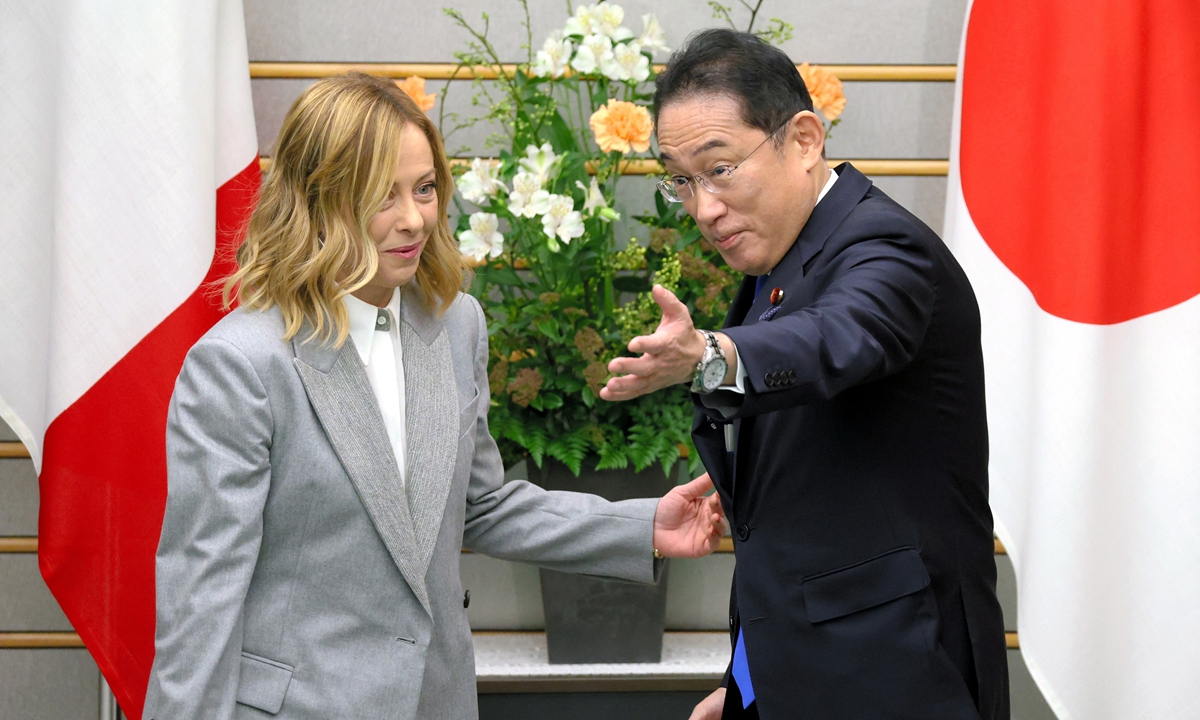
Italian Prime Minister Giorgia Meloni is escorted by Japanese Prime Minister Fumio Kishida prior to their meeting at the Prime Minister's office on February 5, 2024 in Tokyo, Japan. Photo: VCG
The G7 is becoming a US-led mechanism to serve Washington's hegemonic interests to contain its strategic competitors like China and Russia, Chinese experts said, as leaders of G7 nations Japan and Italy discussed a series topics including containment against China during talks in Tokyo on Monday.
Japanese Prime Minister Fumio Kishida and his Italian counterpart Giorgia Meloni agreed Monday to work together toward the success of the G7 summit in June, with Italy taking over the presidency from Japan this year, Kyodo News reported on Tuesday.
Kishida and Meloni reconfirmed their cooperation in supporting Ukraine, while exchanging views on how to tackle "China's growing assertiveness in the Asia-Pacific region."
Cui Hongjian, a professor with the Academy of Regional and Global Governance of Beijing Foreign Studies University, told the Global Times on Tuesday that "In recent years, the major trend of Japan's diplomacy is to strengthen contact and cooperation with European countries due to the impact of the [US'] Indo-Pacific strategy, while at the same time, the G7 has gradually become an important platform and tool for the US' strategy against China."
Japan's relations with Italy were previously more distant than those with other European countries. Other European countries, including the United Kingdom, Germany and some other countries have carried out cooperation with Japan in the form of a "2+2" arrangement. The UK has had close cooperation with Japan in the field of security in recent years, but Italy has little contact with Japan, Cui said.
But after Meloni came to power, this has changed, experts said. Italy is trying to catch up with other EU members in developing ties with Japan.
The relationship between Italy and Japan may not have a great impact on China-EU relations, as ties between China and the EU are based on long-term cooperation and trust and there is resilience in that, Cui said. Italy still needs to cooperate with China, and some problems that recently emerged between China and Italy are caused by the right-wing government. If Italy returns to the governance of one of the traditional political parties, there would be a chance for two sides to repair ties, he said.
Other G7 members like France and Germany, who are also core EU members, will retain their more independent policymaking, as they shared a common ideology with the US but not many concrete interests. If Donald Trump wins the presidential election later this year, US-EU relations will face new challenges, analysts said.
Li Haidong, a professor at the China Foreign Affairs University, told the Global Times that although the US is using the G7 mechanism to target China, it does not mean all G7 members will blindly and unconditionally follow every instruction from Washington. This indicates there is still broad space for China to develop ties and seek pragmatic cooperation with them separately.




